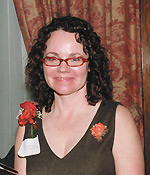Lyric Wordsmith
Open gallery

Averill Curdy’s imagination is in constant motion, filtering images and ideas that might lead to a poem.
One winter day, as she strolled down a Chicago sidewalk, visual impressions from a pre-Columbian artifact exhibition–bark, ribbons, and stag-horn masks–collided with her memory of a small brown sparrow hopping under an airport baggage carousel.
“I kept muttering to myself, trying to come up with the first line,” says Curdy. “I’m sure that I looked like a crazy woman.”
After the first line arrived, the poem began to flow, and “Sparrow Trapped in the Airport” was published in the November 2005 issue of Poetry, a Chicago-based literary magazine.
Last September, Curdy’s promise as a writer was celebrated by New York’s literati at a ceremony in the historic Lotus Club. She and five of her peers each received a $10,000 Rona Jaffe Foundation Writing Award for emerging women writers.
Curdy, who teaches poetry at Northwestern University in Chicago, is a passionate, intelligent writer.
“I want my poems to move people. Even when a piece seems difficult or mysterious, I want it to contain at least one element–an image, language, or sound–that pulls people in and motivates them to spend time with the poem,” she says.
Before entering academia, Curdy worked in corporate planning and publishing and ran her own marketing communications company in Seattle. Microsoft Press was her primary client.
“I’m so much happier now,” she says. “I never look back nostalgically at that time.” But she does appreciate the work ethic she developed in the private sector. “I find that the busier I am, the more things happen creatively.”
In addition to teaching and mentoring students at Northwestern, Curdy coedited the Longman Anthology of Poetry (Allyn & Bacon, 2006). She is now working on Ovid in America, a series of her own lyric poems about historical figures, explorers, naturalists, and nature painters. She is designing the series to examine faith, restlessness, greed, and desire to expand the boundaries of the new world.
Curdy dabbled in poetry as a child and adolescent, but didn’t begin writing seriously until she turned 30. Unsettled by the death of her mother a few years earlier, Curdy decided to change course and fully engage her creative soul. Basking in praise offered by her writing workshop leader, Edward Hirsch, poet and president of the Guggenheim Foundation, she earned an MFA at the University of Houston and a PhD from the University of Missouri.
In today’s fast-paced, visually oriented society, Curdy sees poetry as a marginalized activity that requires patience and solitude.
“In some ways, that’s what I like about it. Moments spent alone with written art are important. Poems broaden, deepen, and preserve what it means to be human.”
–by Pattie Pace
More L&C Magazine Stories
Lewis & Clark Magazine is located in McAfee on the Undergraduate Campus.
MSC: 19
email magazine@lclark.edu
voice 503-768-7970
fax 503-768-7969
The L&C Magazine staff welcomes letters and emails from readers about topics covered in the magazine. Correspondence must include your name and location and may be edited.
Lewis & Clark Magazine
Lewis & Clark
615 S. Palatine Hill Road MSC 19
Portland OR 97219

